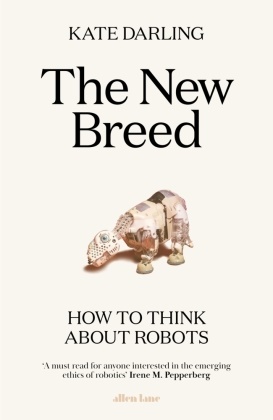Read more
'A must read for anyone interested in the emerging ethics of robotics' Irene M. Pepperberg
'Endless ink has been spilled on AI and our robot future. Just when it seems there's nothing left to be said, along comes Kate Darling's book. For the first time, it seems we're having the conversation we ought to be having' Tim O'Reilly
A bold, optimistic exploration of the relationship between robots and humans based on our history with animals, from a renowned MIT researcher
The robots are here. They make our cars, they deliver fast food, they mine the sea floor. And in the near-future their presence will increasingly enter our homes and workplaces - making human-robot interaction a frequent, everyday occurrence. What will this future look like? What will define the relationship between humans and robots?
Here Kate Darling, a world-renowned expert in robot ethics, shows that in order to understand the new robot world, we must first move beyond the idea that this technology will be something like us. Instead, she argues, we should look to our relationship with animals. Just as we have harnessed the power of animals to aid us in war and work, so too will robots supplement - rather than replace - our own skills and abilities.
A deeply original analysis of our technological future and the ethical dilemmas that await us, The New Breed explains how the treatment of machines can reveal a new understanding of our own history, our own systems and how we relate - not just to non-humans, but also to each other.
About the author
Kate Darling is a researcher at the Massachusetts Institute of Technology (MIT), where she investigates social robotics and conducts experimental studies on human-robot interaction.
Summary
'A must read for anyone interested in the emerging ethics of robotics' Irene M. Pepperberg
'Endless ink has been spilled on AI and our robot future. Just when it seems there's nothing left to be said, along comes Kate Darling's book. For the first time, it seems we're having the conversation we ought to be having' Tim O'Reilly
A bold, optimistic exploration of the relationship between robots and humans based on our history with animals, from a renowned MIT researcher
The robots are here. They make our cars, they deliver fast food, they mine the sea floor. And in the near-future their presence will increasingly enter our homes and workplaces - making human-robot interaction a frequent, everyday occurrence. What will this future look like? What will define the relationship between humans and robots?
Here Kate Darling, a world-renowned expert in robot ethics, shows that in order to understand the new robot world, we must first move beyond the idea that this technology will be something like us. Instead, she argues, we should look to our relationship with animals. Just as we have harnessed the power of animals to aid us in war and work, so too will robots supplement - rather than replace - our own skills and abilities.
A deeply original analysis of our technological future and the ethical dilemmas that await us, The New Breed explains how the treatment of machines can reveal a new understanding of our own history, our own systems and how we relate - not just to non-humans, but also to each other.
Report
Well-researched, well-developed, and well-written, Darling's innovative proposal - to use our history of human-animal interactions as a blueprint for the future of human-robot interactions - is a must read for anyone interested in the emerging ethics of robotics. The New Breed raises serious questions and provides some intriguing answers Irene M. Pepperberg

